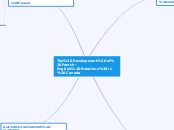The Development of French-English Relations in Canada
Unit 1: 1914 - 1929
People
PM Robert Borden
Potential Artifact (Visual):
A picture of Borden speaking to Canadians Troops in Seaford on August 11th, 1918, which shows his support for a bigger Canadian Military in order to achieve victory.
Events
World War I Conscription Crisis
Potential Artifact (Physical):
A poster that describes the Military Service Act of 1917, which enabled the mandatory conscription of men, something that many French Canadians were against.
Ideas
French Canadians and their view on
Canada's Participation in Foreign Affairs
Potential Artifact (Written):
A newspaper article that showcases when England declared
war in WWI, which, at the time, meant Canada was joining the war. French Canadians were opposed to joining affairs not concerning them.
Unit 2: 1929 - 1945
People
Maurice Duplessis, Premier of Quebec
Potential Artifact (Visual):
A photograph of Maurice Duplessis during his time as
Premier of Quebec while waving a Quebec flag in this picture, showing his support for French Separatism.
Events
World War II Conscription
Potential Artifact (Written):
A newspaper from WWII speaking on how Canadians voted on if the Canadian Government could conscript men if needed.
Ideas
Union Nationale
Potential Artifact (Physical):
A poster from the Union Nationale, a political party created in the late 1930's in Quebec.
Unit 4: 1982 - Present
People
Jean Chrétien
Jean Chrétien is a man who was instrumental
in constitutional talks, and would be Prime Minister in the future. However, during these talks, he made a deal when Quebec was not at the table to discuss this condition, which led to Quebec leaving the talks and not signing the constitution.
Potential Artifact (Visual):
A picture of Jean Chrétien signing the constitution with Queen Elizabeth.
Events
The 1995 Quebec Referendum
The 1995 Quebec Referendum was the peak
of Quebec Separatism, with many Francophone
Canadians showing their frustration towards the Canadian Government. This led to a referendum for Quebec Sovereignty, which ended with the 'No' side barely winning by 1%.
Potential Artifact (Physical):
A propaganda poster supporting the 'Yes' side of the referendum, which was common in Quebec.
Ideas
The fading of Quebec Separatism
Quebec Nationalism was at an all time high
in 1995, with the referendum showing that
49.4% of Quebecois wanted to have their own
nation. However, over the past two decades,
this separatism has slightly faded, which has led
to improved relations between Anglophone and
Francophone Canadians.
Potential Artifact (Written)
Article describing the results of a poll, which show
many Quebecois believe that the issue of sovereignty
is over, and that Quebec should stay in Canada
Unit 3: 1945 - 1982
People
Pierre Trudeau
Potential Artifact (Visual):
A picture of Pierre Trudeau alongside Queen Elizabeth in 1982 signing the constitution.
Events
The 1980 Quebec Referendum
Potential Artifact (Written):
An article describing the outcome of the 1980 Quebec Referendum, where the 'No' side won 60%/40%.
Ideas
The Growth of Quebec Separatism
Potential Artifact (Physical):
A Quebec flag from the late 1940's, the time at which it was created and established as Quebec's flag.
